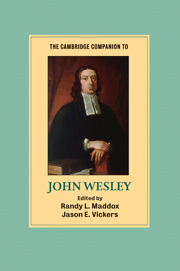Book contents
- Frontmatter
- Introduction
- Part I Wesley’s context
- Part II Wesley’s life
- Part III Wesley’s work
- 4 Wesley as revivalist/renewal leader
- 5 Wesley as preacher
- 6 Wesley as biblical interpreter
- 7 John Wesley as diarist and correspondent
- 8 John Wesley as editor and publisher
- 9 Wesley’s engagement with the natural sciences
- 10 Wesley as adviser on health and healing
- 11 Wesley’s theological emphases
- 12 Happiness, holiness, and the moral life in John Wesley
- 13 Wesley’s emphases on worship and the means of grace
- Part IV Wesley’s legacy
- Select bibliography
- Index
11 - Wesley’s theological emphases
from Part III - Wesley’s work
Published online by Cambridge University Press: 28 September 2010
- Frontmatter
- Introduction
- Part I Wesley’s context
- Part II Wesley’s life
- Part III Wesley’s work
- 4 Wesley as revivalist/renewal leader
- 5 Wesley as preacher
- 6 Wesley as biblical interpreter
- 7 John Wesley as diarist and correspondent
- 8 John Wesley as editor and publisher
- 9 Wesley’s engagement with the natural sciences
- 10 Wesley as adviser on health and healing
- 11 Wesley’s theological emphases
- 12 Happiness, holiness, and the moral life in John Wesley
- 13 Wesley’s emphases on worship and the means of grace
- Part IV Wesley’s legacy
- Select bibliography
- Index
Summary
To understand and appreciate John Wesley, it is imperative to locate his life and work within the intellectual, social, and political context of England's long eighteenth century. Other essays in this volume deal at length with Wesley's social and political context. This essay will focus primarily on the ways in which Wesley inhabited and deeply enriched a particular theological tradition, namely, English Arminianism. To that end, it is important to begin with a few background considerations. / Background Developments / One of the most intractable disputes within Wesleyan studies has to do with where to locate John Wesley within the wider Christian theological tradition. For example, whereas some scholars insist that Wesley belongs to the magisterial Protestant tradition, others maintain that he was deeply indebted to Roman Catholicism or Eastern Orthodoxy. Among those who associate Wesley primarily with Protestantism, there is a lively debate concerning which of the Protestant traditions he inhabited most deeply. For example, some argue that he was essentially Lutheran in outlook, whereas others suggest that he is best understood within the Reformed tradition. Nor does the debate end there. Thus, some scholars insist that Wesley belongs specifically to the German-Pietist tradition, whereas others contend that he was ultimately a Puritan in outlook
- Type
- Chapter
- Information
- The Cambridge Companion to John Wesley , pp. 190 - 206Publisher: Cambridge University PressPrint publication year: 2009
- 1
- Cited by



